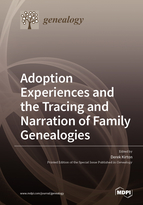Adoption Experiences and the Tracing and Narration of Family Genealogies
A special issue of Genealogy (ISSN 2313-5778).
Deadline for manuscript submissions: closed (31 July 2018) | Viewed by 37604
Special Issue Editor
Special Issue Information
Dear Colleagues,
This special issue of Genealogy invites essays on the topic of ‘Adoption Experiences and the Tracing and Narration of Family Genealogies’.
With its inherent genealogical disruptions, adoption provides a perfect avenue to generate what Amy Smith (Genealogy, 1,1) has described as ‘stories from the margin’ as a means to better understand genealogical processes. Experiences of (un)belonging and (dis)connectedness must be addressed through the complex set of relationships between two families, and in many cases differences of class, community, race, ethnicity or nation. These can usefully be further explored in their intersections with issues of gender and sexual orientation and through their spatial and temporal dimensions.
Interests in identity, searching and reunion or the degrees of openness and closure within adoption are obvious areas for analysis, but also articulate with much wider processes of making and narrating meaning, for example in oral and written forms. While adoption is in itself closely linked with genealogical concerns, there is also considerable scope for the use of genealogical methods to study its history and discourses and interrogate received wisdom on their pathways, as shown by authors such as Sally Sales in her book ‘Adoption, Family and the Paradox of Origins’. Thus, the overarching purpose of the special issue is to encourage insights and development in genealogical studies through work from the field of adoption and in turn, to explore the value of genealogical methods to understandings of adoption.
Papers are invited from any relevant disciplinary backgrounds, addressing but not limited to the topics listed below:
Searching, tracing, reunions
Open adoption
Access to records
Identities and genealogy—personal and social, hybridity, essentialism, fluidity
Genealogical bewilderment
Naming practices
Writing genealogy—guides for adopted people,
Writing genealogy—accounts in popular culture
Social media, internet, adoption and genealogy
Family stories and genealogy (including those of birth and adoptive families)
Secrets & lies in genealogy
Transracial adoption and genealogy
International adoption and genealogy
Authoethnography and genealogy
Genealogical communities and activism
Oral history and memory
Adoption professionals’ work with genealogical issues
Dr. Derek Kirton
Guest Editor
Manuscript Submission Information
Manuscripts should be submitted online at www.mdpi.com by registering and logging in to this website. Once you are registered, click here to go to the submission form. Manuscripts can be submitted until the deadline. All papers will be peer-reviewed. Accepted papers will be published continuously in the journal (as soon as accepted) and will be listed together on the special issue website. Research articles, review articles as well as short communications are invited. For planned papers, a title and short abstract (about 100 words) can be sent to the Editorial Office for announcement on this website.
Submitted manuscripts should not have been published previously, nor be under consideration for publication elsewhere (except conference proceedings papers). All manuscripts are thoroughly refereed through a single-blind peer-review process. A guide for authors and other relevant information for submission of manuscripts is available on the Instructions for Authors page. Genealogy is an international peer-reviewed open access quarterly journal published by MDPI.
Please visit the Instructions for Authors page before submitting a manuscript. Submitted papers should be well formatted and use good English. Authors may use MDPI's English editing service prior to publication or during author revisions.
Keywords
- genealogy
- genealogical methods
- adoption
- adoption triangle
- identity
- kinship
- belonging
- transracial adoption
- international adoption
- open adoption
- Narrative






